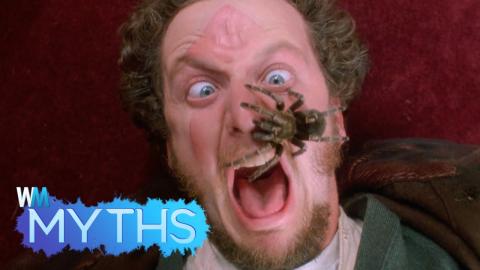Top 5 Myths About Spiders

Consider this your one-stop-shop for the cure to Arachnophobia. Welcome to WatchMojo's Top 5 Myths, the series that finds the biggest myths people actually believe, and dispels them one by one. In this instalment we're dispelling five myths about Spiders that bug us the most. And for the record, Spiders aren't insects...so that previous pun doesn't have 8 legs to stand on.
Special thanks to our user jwiking62 for submitting the idea using our interactive suggestion tool at http://www.WatchMojo.comsuggest
Top 5 Myths: Spiders
Consider this your one-stop-shop for the cure to Arachnophobia. Welcome to WatchMojo’s Top 5 Myths, the series that finds the biggest myths people actually believe, and dispels them one by one. In this instalment we're dispelling five myths about Spiders that bug us the most. And for the record, Spiders aren’t insects...so that previous pun doesn’t have 8 legs to stand on.
#5: “Daddy Longlegs Have The Most Powerful Venom”
This one might be a little more obscure, but it does get repeated fairly often online, leading many to believe that these spindly-legged house-invaders contain a powerful poison but don’t possess the fangs to inject it. There’s something compelling about the smallest thing being the most powerful, like Will Smith’s gun in Men in Black [1] but it’s simply not true in this case. Heck, most creatures identified as “Daddy Long Legs” are not even spiders at all. The most common are actually “harvestmen”, a type of arachnid that have a single pair of eyes unlike spiders and contain absolutely no venom. What's more, the only similar spiders you might find, Pholcidae or cellar spiders, carry only a very mild toxin that could cause nothing more than a slight irritation, like one of Will Smith’s kids
#4: “Spiders Are Going to Attack Me!”
While you may be led to believe that spiders are hellbent on pouncing at you, it’s time to drop the broom and step off the stool. Spiders are not inherently aggressive. This myth may come down to human’s irrational fear of creepy-crawlies which many studies suggest is simply a product of cultural relativism rather than evolution. Spider specialist Rod Crawford claims that they are actually docile by nature and has only been bitten a few times in his many years of study. Instead, spiders usually only bite humans if they feel threatened. So, as the old cliche goes, they’re probably more afraid of you than you are of them.
#3: “Putting a Spider Outside Is More Humane Than Killing It"
Don’t go taking the moral high ground with us for this one. While squashing these unwanted guests may seem a little cruel, escorting them off premises leads to the exact same result. Though it’s commonly believed that spiders inhabit our homes to escape the cold, the truth is they’ve evolved to create an indoor ecosystem. As Crawford suggests, when taken outside, they’re stripped not only of their habitat but also their source of nutrition. In fact, some spider breeds are estimated to have been domesticated over 2000 years ago. You could even go as far as to suggest that coexisting with spiders is beneficial to us, as they rid houses of common pests such as roaches, earwigs and ants. So next time you grab the ol’ glass and sheet of paper, remember that you’re just leading them to a different grave– let's just learn to get along instead.
#2: “Spiders Lay Eggs Under People’s Skin”
Sure they may look like Giger-esque horrors, but don’t expect their babies to come bursting out of you. This myth could stem from Nobel Prize winner, Kary Mullis’ book “Dancing Naked in the Mind Field” in which he suggests that a brown recluse spider may scratch a hole into human flesh and lay her eggs inside - but there is simply no scientific basis for this. The truth is Spiders simply wouldn’t be able to do such a thing as their egg-laying organ, known as the “ovipositor”, does not possess any means of injecting eggs at all. Though spiders could technically lay them on the surface of your skin, there would be no benefits at all in doing so. Instead, they choose to lay eggs in quieter, less threatening areas, so that all their beautiful, disgusting, children are safely assured the gift of life… before inevitably swarming all over your face while you sleep. Speaking of which...
#1: “You Swallow Spiders in Your Sleep”
It may perhaps be the most widespread myth about spiders that we all swallow a certain number of them per year. If you fell for it, that’s reportedly all thanks to a social experiment conducted by one Lisa Holst in 1993. In order to prove that humans are a gullible old bunch, Holst sent out a series of factually incorrect emails, including one about swallowing spiders in your sleep. But wait! The BBC, among others, say this Lisa Holst person doesn’t even exist! Myth within a myth anyone? In truth, Spiders don’t have the innate urge to crawl down your gullet to face their own demise. As highlighted before, they’re often rather reclusive and avoid confrontation with larger creatures. And as Rod Crawford highlights, there are no eye-witness accounts of spidey-suicide occurring.
So how about we break the bread with our eight-legged lodgers– shake on it? This is what the Google searchers think about spiders. And by the way, yes, spider rain is a thing For more web-slinging Top 10s and hair-whipping Top 5s published daily, be sure to subscribe to Watchmojo.com!
